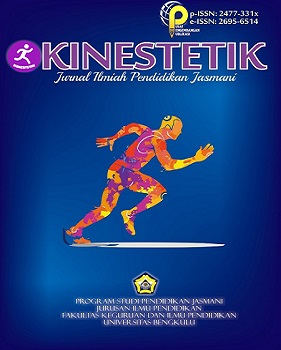Main Article Content
Abstract
This study aims to investigate the relationship between teacher competency and motivation with student learning outcomes in the Physical Education subject in elementary schools throughout the Seventeen District. The research method is correlation research. The research sample consisted of 10 Physical Education teachers from various elementary schools in Seventeen District. Data was collected through a research instrument in the form of a questionnaire that had been tested for validity and reliability. The results showed that there was a significant positive relationship between teacher competence in teaching Physical Education subjects and student learning outcomes. Teachers who have higher competence in teaching Physical Education tend to have students with better learning outcomes. In addition, the research results also show that there is a significant positive relationship between teacher motivation in teaching Physical Education and student learning outcomes. Teachers who are highly motivated in teaching Physical Education tend to have students with better learning outcomes. This research provides important implications in the context of improving the quality of Physical Education learning in elementary schools. Teachers need to continue to develop their competence in teaching Physical Education subjects, with attention to effective and relevant teaching methods. In addition, teacher motivation also needs to be considered, so that teachers can create a learning environment that motivates students to achieve optimal learning outcomes.
Keywords
Article Details
Copyright (c) 2023 Tarlina, Ashadi Cahyadi, Suriani Sari

This work is licensed under a Creative Commons Attribution-ShareAlike 4.0 International License.
Authors who publish in this journal agree with the following terms:- Authors retain copyright and grant the journal right of first publication with the work simultaneously licensed under a Creative Commons Attribution-ShareAlike 4.0 (CC BY-SA) that allows others to share the work with an acknowledgement of the work's authorship and initial publication in this journal.
- Authors are able to enter into separate, additional contractual arrangements for the non-exclusive distribution of the journal's published version of the work (e.g., post it to an institutional repository or publish it in a book), with an acknowledgement of its initial publication in this journal.
- Authors are permitted and encouraged to post their work online (e.g., in institutional repositories or on their website) prior to and during the submission process, as it can lead to productive exchanges, as well as earlier and greater citation of published work (See The Effect of Open Access).
- This work is licensed under a Creative Commons Attribution-ShareAlike 4.0 International License.
References
- Raibowo, S., Nopiyanto, Y. E., & Muna, M. K. (2019). Pemahaman Guru PJOK Tentang Standar Kompetensi Profesional. Journal Of Sport Education (JOPE), 2(1), 10. https://doi.org/10.31258/jope.2.1.10-15.
References
Raibowo, S., Nopiyanto, Y. E., & Muna, M. K. (2019). Pemahaman Guru PJOK Tentang Standar Kompetensi Profesional. Journal Of Sport Education (JOPE), 2(1), 10. https://doi.org/10.31258/jope.2.1.10-15.
